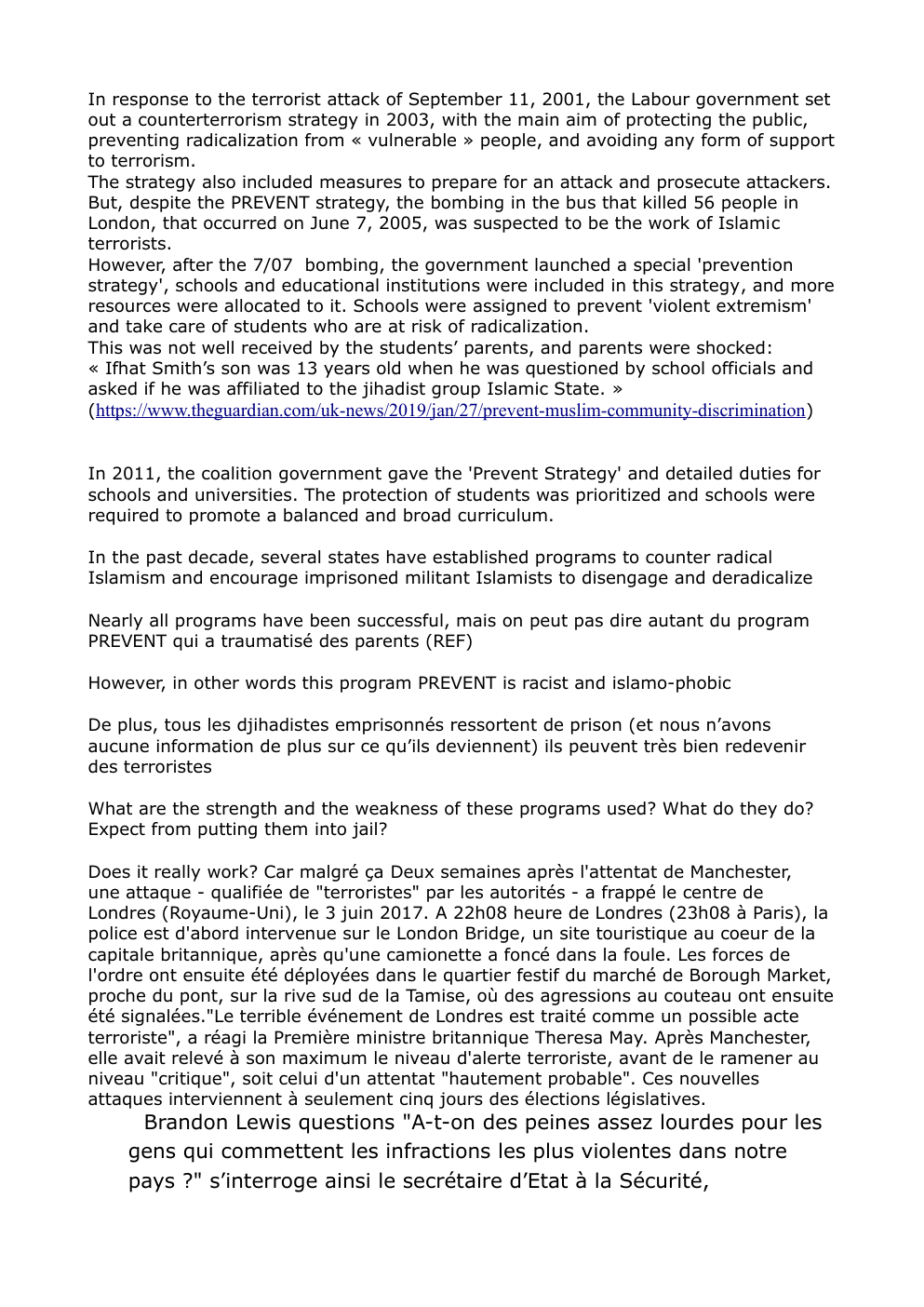Essay Islam in the UK
Publié le 30/04/2022

Extrait du document
«
In response to the terrorist attack of September 11, 2001, the Labour government set
out a counterterrorism strategy in 2003, with the main aim of protecting the public,
preventing radicalization from « vulnerable » people, and avoiding any form of support
to terrorism.
The strategy also included measures to prepare for an attack and prosecute attackers.
But, despite the PREVENT strategy, the bombing in the bus that killed 56 people in
London, that occurred on June 7, 2005, was suspected to be the work of Islamic
terrorists.
However, after the 7/07 bombing, the government launched a special 'prevention
strategy', schools and educational institutions were included in this strategy, and more
resources were allocated to it.
Schools were assigned to prevent 'violent extremism'
and take care of students who are at risk of radicalization.
This was not well received by the students’ parents, and parents were shocked:
« Ifhat Smith’s son was 13 years old when he was questioned by school officials and
asked if he was affiliated to the jihadist group Islamic State.
»
(https://www.theguardian.com/uk-news/2019/jan/27/prevent-muslim-community-discrimination)
In 2011, the coalition government gave the 'Prevent Strategy' and detailed duties for
schools and universities.
The protection of students was prioritized and schools were
required to promote a balanced and broad curriculum.
In the past decade, several states have established programs to counter radical
Islamism and encourage imprisoned militant Islamists to disengage and deradicalize
Nearly all programs have been successful, mais on peut pas dire autant du program
PREVENT qui a traumatisé des parents (REF)
However, in other words this program PREVENT is racist and islamo-phobic
De plus, tous les djihadistes emprisonnés ressortent de prison (et nous n’avons
aucune information de plus sur ce qu’ils deviennent) ils peuvent très bien redevenir
des terroristes
What are the strength and the weakness of these programs used? What do they do?
Expect from putting them into jail?
Does it really work? Car malgré ça Deux semaines après l'attentat de Manchester,
une attaque - qualifiée de "terroristes" par les autorités - a frappé le centre de
Londres (Royaume-Uni), le 3 juin 2017.
A 22h08 heure de Londres (23h08 à Paris), la
police est d'abord intervenue sur le London Bridge, un site touristique au coeur de la
capitale britannique, après qu'une camionette a foncé dans la foule.
Les forces de
l'ordre ont ensuite été déployées dans le quartier festif du marché de Borough Market,
proche du pont, sur la rive sud de la Tamise, où des agressions au couteau ont ensuite
été signalées."Le terrible événement de Londres est traité comme un possible acte
terroriste", a réagi la Première ministre britannique Theresa May.
Après Manchester,
elle avait relevé à son maximum le niveau d'alerte terroriste, avant de le ramener au
niveau "critique", soit celui d'un attentat "hautement probable".
Ces nouvelles
attaques interviennent à seulement cinq jours des élections législatives.
Brandon Lewis questions "A-t-on des peines assez lourdes pour les
gens qui commettent les infractions les plus violentes dans notre
pays ?" s’interroge ainsi le secrétaire d’Etat à la Sécurité,.
»
↓↓↓ APERÇU DU DOCUMENT ↓↓↓
Liens utiles
- Essay: The Way Up to Heaven
- Essay : Stranger in the village
- Essay English : In Arthur Miller’s play “All my sons”, Joe Keller is a hero in his family and in the neighborhood even if he did some very awful things.
- Essay The great Gatsby/bluest eye
- Nathaniel Hawthorne The Scarlet Letter Essay


